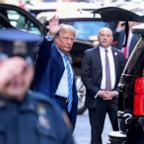Budget vote shows Specter's party switch isn't a lock
WASHINGTON -- Hours after telling President Obama that he would be no automatic vote for Democrats — even though he had just joined their ranks — Pennsylvania Sen. Arlen Specter proved the point.
In one of his first major votes since defecting to the Democratic Party, Specter sided with Republicans and voted against a $3.4 trillion budget Wednesday night that laid the broad groundwork for policies championed by Obama's administration.
Though not unexpected, the vote underscores Specter's independent streak. It also suggests that just because Democrats are one seat closer to a 60-vote majority, it doesn't mean Obama's agenda will be a lock in Congress.
As Congress prepares to tackle an overhaul of the nation's health care system and a proposal to reduce carbon dioxide emissions, it may be crucial for the Senate Democrats to reach 60 votes to overturn GOP-led filibusters that could block votes on bills.
Now with Specter as a Democrat, the party hopes to rely on 59 votes. They could hit 60 this year if Al Franken wins the Minnesota race. Franken is ahead, but the state's highest court is considering a challenge to the results.
Specter, a five-term senator known as a contrarian, appeared with Obama on Wednesday — a day after he announced he has switched parties and will seek re-election as a Democrat in 2010. He said he will help advance Democratic policies but also cautioned: "I will not be an automatic 60th vote."
Emory University political scientist Randall Strahan said it is a mistake to believe that Specter will help "produce a solid filibuster-proof majority in the Senate that will support all the initiatives of the administration."
"Sen. Specter has been a fairly independent senator as a Republican, and I don't think that's going to change," Strahan said.
Nevertheless, advocates of expanding health insurance coverage predict Specter will put Congress in a stronger position to pass a bill this year.
Specter, who has battled cancer, has sought increased funding for medical research in the past and was one of nine Senate Republicans who voted this year to expand state health insurance programs for children.




